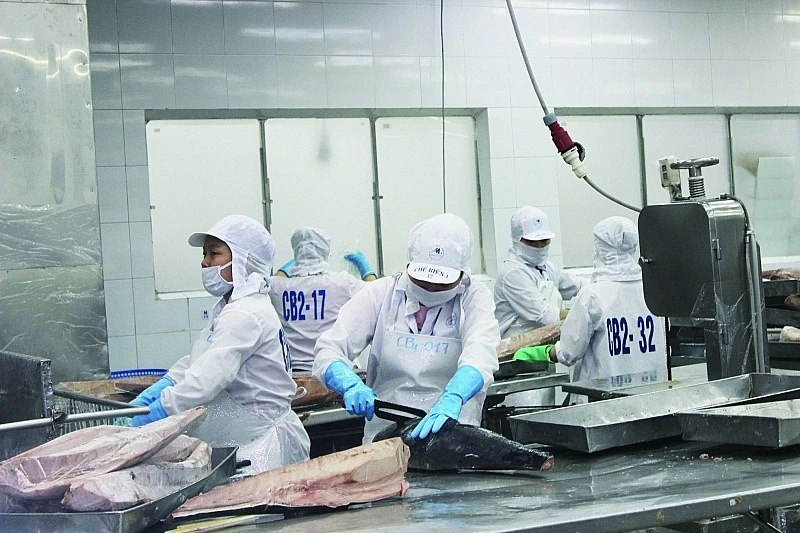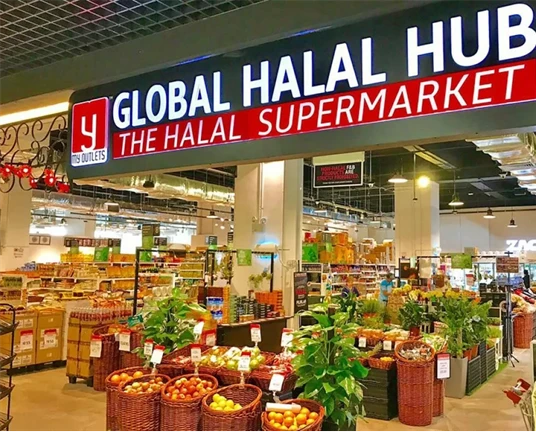


Vietnam shifts its export focus to the billion-dollar Halal market
The path to conquering Halal standards
Having successfully exported to Islamic countries (Halal markets) for many years, Mrs. Cao Thi Kim Lan, Director of Binh Dinh Seafood Joint Stock Company, stated that in recent years, the company's tuna exports to the EU were affected by the IUU yellow card. Consequently, the company diversified its market, shifting exports to Halal markets, resulting in increasing daily orders.
To enter the Halal market, a Halal certification is required. Islamic countries make up a third of the world's population. Muslims are willing to pay higher prices for green, clean products that are Halal certified. Companies need to meet these criteria for sustainable exports.

Recently, free trade agreements have provided many tax benefits and streamlined procedures for exporting Vietnamese goods with Halal certification. Particularly, Vietnam and the UAE recently signed the Comprehensive Economic Partnership Agreement (CEPA), ushering in a new era between Vietnam and the UAE and Arab countries in general.
Of note is the strong commitment from both sides towards trade liberalization, with the UAE committing to gradually eliminate tariffs on 99% of Vietnam's exports to the UAE. The agreement also includes provisions that facilitate trade and investment, aligning with current trends in digital transformation and sustainable development.
Currently, tuna products imported into the UAE are subject to a 5% tax. Therefore, businesses expect this market to expand further when the FTA between Vietnam and the UAE takes effect, reducing seafood import taxes to 0% in this country.
In addition to customs duties, the biggest challenge for businesses exporting to the UAE is meeting the importers' requirements related to Halal certification. Products must not contain any ingredients prohibited by Islamic law; throughout the production process, products must not come into contact with any materials or devices not permitted by Islamic law; and during production, products must not come into contact with any nutrients from ingredients not accepted by Islamic law. This issue is currently a focus for businesses to address.
Maximizing the trillion-dollar market
Mr. Dao Minh Chanh, Deputy Director of the Ho Chi Minh City Investment and Trade Promotion Center (ITPC), mentioned that the Halal industry is rapidly growing with over 2 billion Muslims worldwide. Establishing Halal standards from production to distribution is becoming a critical trend, presenting significant opportunities for Vietnamese businesses. The global Halal economy is projected to reach over $7 trillion in 2024, expected to increase to around $10 trillion by 2028.

To ensure sustainable exports, establishing Halal standards is crucial. Therefore, businesses and manufacturers need to set specific criteria in the Halal production process, including factors such as complaint quantity, Halal incidents, inspection frequency, trained staff rates, Halal maturity levels, Halal trust, Halal reputation index, operating licenses, and Halal rankings.
Businesses and suppliers also need to build a reputable Halal brand based on product quality and the entire Halal business value chain's quality, develop practical roadmaps to implement the Halal value chain, and review progress.
Mr. Firdauz Bin Othman, Consul General of Malaysia in Ho Chi Minh City, mentioned that Halal standards are now globally accepted, particularly in food safety and hygiene. This has positively contributed to the development and increased demand for Halal products. The Halal food sector is rapidly growing and is forecasted to reach a value of around $4.5 trillion by 2030. This market is growing due to the global Muslim population growth and the demand for Halal-certified products. This has presented significant opportunities for many countries, including Vietnam, to actively access the Halal market.


